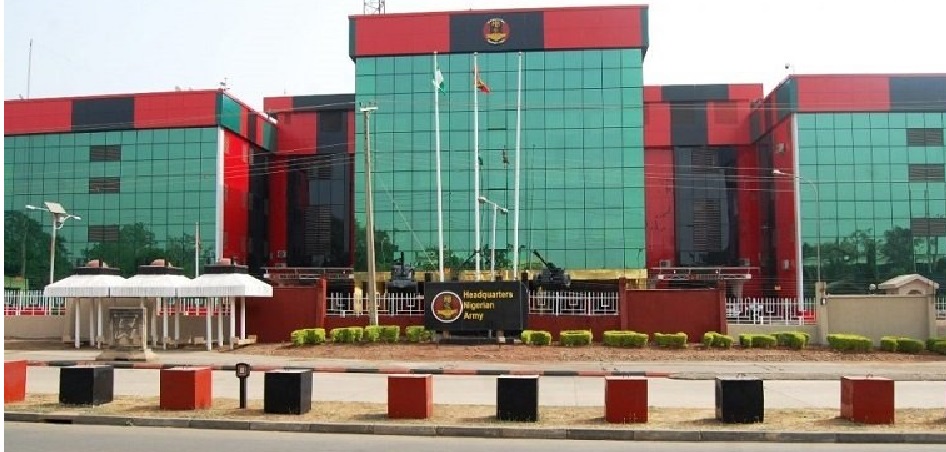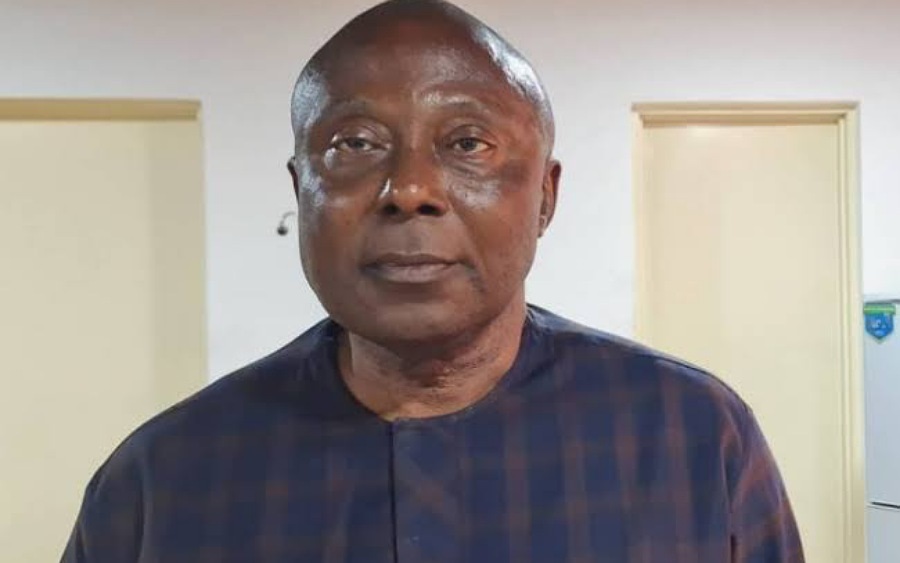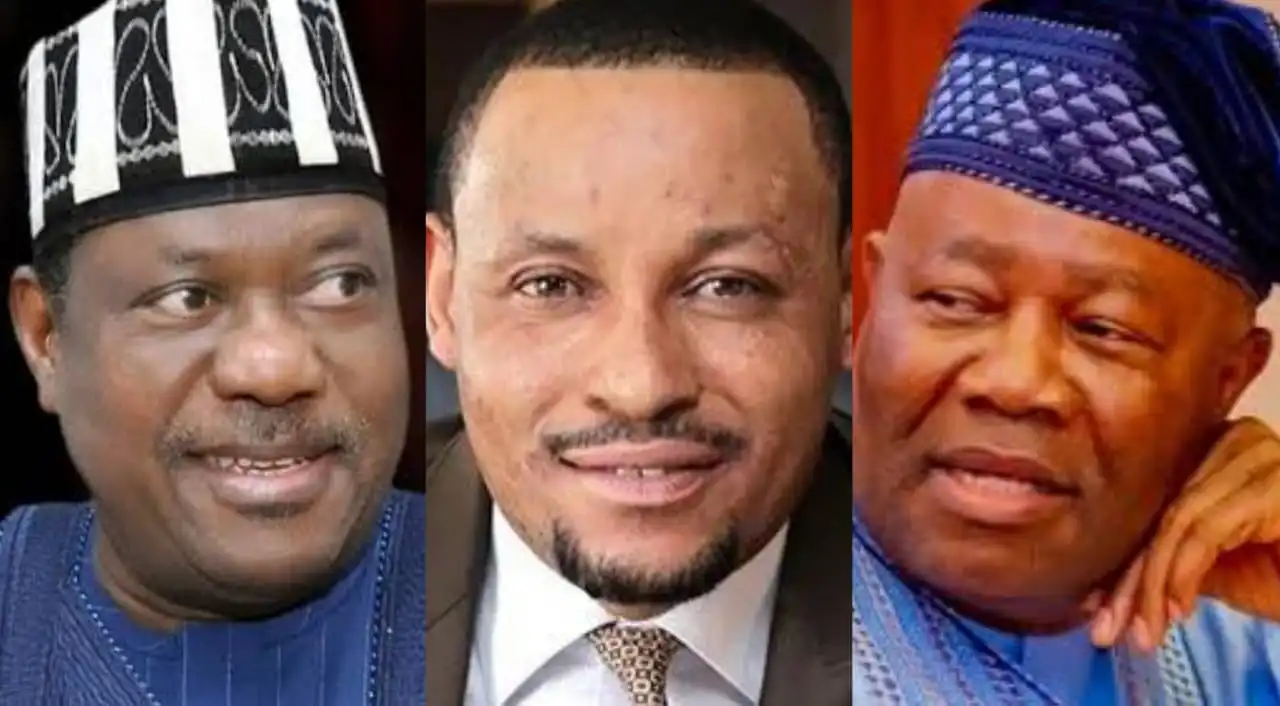News
Army urged to obey judgment, release traders

Two lawyers – Mr Siraj Hamza and Junaid Sanusi – have called on the Nigerian Army to comply with the judgment of a Borno State High Court directing it to release 14 of their clients from illegal detention.
Hamza also called on the Attorney-General of the Federation and Minister of Justice Prince Lateef Fagbemi (SAN) to establish a mechanism to audit detention facilities across the nation.
Hamza has A. Aliyu as the second lawyer representing the detained men.
Explaining that despite the judgment which declared that detention of his clients without trial violated their rights, the Army has refused to obey court order, suggesting that it is above the law.
He said his clients were arrested and detained on their way to rural communities where they went to buy cows meant to be slaughtered and given to indigent Muslims during Sallah.
Hamza told reporters in Ibadan, the Oyo State capital: “Sometimes on May 17, 2024 along Buratai-Miringa Road, our clients, 12 of them, were riding in two buses on their way to Tashan Alade Cattle Market to buy cattle which were to be used during the Eid Al-Kabir festival, an annual event being organised by a non-governmental organisation where cows in their hundreds are slaughtered and shared or distributed among the indigent members of the society. The exercise had been on for over a decade and has been impacting on the indigent members of Abuja and its environs, including the military.
“The exercise was extended to Bauchi, Yola and Maiduguri, hence the need to buy about 600 heads of cow for the exercise in Maiduguri. Before the incident of May 17, 2024; our clients had already purchased 241 heads of cow and transported them to Maiduguri and were entrusted with one Musa Mustapha Umar at the Maiduguri Cattle Market; while one Abubakar Ibrahim Murabus Potiskum was in the company of our clients assisting them to source money from Point of Sale (PcS) operators and filling stations due to impracticability of electronically transacting business in the various cattle markets.’’
“As earlier stated, our clients were stopped by the Civilian JTF who searched them without finding anything incriminating on them, save for the $88,737,200. When they discovered that our clients had over $88,737,200 with them, they demanded for gratification before they could be cleared to leave, but they declined as a result of which they were transferred to the military outpost in Buratai where they were again interrogated and detained. The following day which was May 18, 2024; they were transferred to Sector 2 at Damatur from where they were transferred to the Headquarters of Theatre Command, Operation Hadin Kai in Maiduguri which marked the beginning of their incarceration.
“It is also worthy to state that the first 12 of them came from Dei-Dei Livestock Market, Abuja, led by Danlami Muhammad Bashir, the alter ego of Fatima Meat, the company that was contracted to procure the heads of cow.
Few weeks after, when the detention of the judgment-creditor that is, our clients was becoming prolonged, the Chairman of their association, Alhaji Shagari Usman Yusuf, flew into Maiduguri to see them in company of their lawyer which was unsuccessful.
“Prior to that, Alhaji Musa Mustapha Umar too had been arrested and detained for having the audacity to visit them at the Theatre Command of Operation Hadin Kai.
Shagari was displeased with the actions of the military which prompted him to approach the popular Berekete Family in Abuja to ventilate their grievances. The president contacted the Army spokesman and Shagari was invited to the Army Headquarters twice.
“Ironically, a day to the Eid Adha festival, some armed military personnel armed to the teeth, stormed the Dei-Dei International Cattle Market where they arrested him, hooded him, tortured him and later found himself in an underground cell in Abuja before he was eventually brought to Maiduguri by one Colonel Wasiu Ademola Adegoke 18 days after,and detained with the others at the Giwa Barracks.”
The lawyers insisted that the disobedience to court order is against the rule of law, adding that the Army was free to appeal the judgment and apply for of execution if it so desires.
The August 6 judgment by Justice Babagana Karumi of Borno State High Court directed the Army to release the men or sue them within seven days if a prima facie case is established against them. Hamza said the Army was still keeping his clients in detention after over 45 days of the judgment, saying it signals danger for the society.
News
NCAA Revokes Eastwind Aviation, Omni-Blu’s Operating Licences

By Kayode Sanni-Arewa
The Nigerian Civil Aviation Authority has revoked the Air Operator Certificates of two operators: Eastwind Aviation Logistics Services Limited and Omni-Blu Aviation.
This was done to address falsification, reproduction, or alteration of applications, licenses, certificates, logbooks, reports, or records.
The agency made this announcement on its official X account on Friday
According to the agency, “The Authority has determined that both Omni-Blu Aviation and Eastwind Aviation are in violation of Part 1.2.1.5 of Nig. CARs on Falsification, Reproduction, or Alteration of Applications, Licences, Certificates, Logbooks, Reports, or Records.”
“Part 1.2.1.5(b) of Nig. CARs provide the sanction for such fraud as revocation of the certificate.
“Consequently, their respective Air Operator Certificates OBA/AOC/12-15/002 and EAL/AOC/03-24/001 are hereby revoked,” the agency said
Recall that On October 24, 2024, a helicopter operated by Eastwind Aviation Logistics Services Limited crashed into the Atlantic Ocean near Bonny Finima in Rivers State.
The helicopter, which the Nigerian National Petroleum Company Limited had chartered, was carrying eight passengers when the accident occurred.
The Nigerian Safety Investigation Bureau promptly initiated an investigation into the cause of the crash, though it has not yet released the results of its findings.
Meanwhile, top officials of OmniBlu are currently in a meeting towards resolving the matter.
News
Alleged N1.96bn fraud: Banker, director testify against ex-acting AGF

The Federal High Court sitting in Abuja, on Friday, heard how a former Acting Accountant-General of the Federation, AGF, Mr. Anamekwe Nwabuoku, used four different companies to siphon public funds to the tune of about N1.96billion.
A Director in the Federal Civil Service, Mr. Felix Nweke, made the revelation when he testified as a witness in the amended nine-count money laundering charge the Economic and Financial Crimes Commission, EFCC, preferred against the erstwhile Acting AGF.
Nweke, who mounted the box as the second prosecution witness, PW-2, told the court that in a bid to conceal the fraud, the looted funds were channelled into bank accounts that had one Gideon Joseph as the sole signatory.
Led in evidence by EFCC’s lawyer, Mr. Ekele Iheanacho, SAN, the witness, while tracing the origin of the fraud, told the court that he worked under the defendant while he served as a Deputy Director in the Defence Ministry.
According to the witness who disclosed that he was the Deputy Director in charge of the Ministry’s expenditure, between 2018 and 2020, part of his functions included the preparation of schedule of inflows and outflows that were due to the Army, Navy and the Air Force.
Nweke said in 2018 when the ex-Acting AGF was posted to the Ministry, he (Nwabuoku) told him that there was the need to make funds available to facilitate some critical stakeholders, the National Assembly and the Federal Ministry of Finance.
He said the defendant, who insisted that they must be creative, suggested that they should get some companies they could use to pull out funds.
He said it was at that point that they contacted Mr. Joseph who was always coming to the ministry with his brother to make supplies.
Continuing, the PW-2, said though Joseph was initially begging him for contracts, he was persuaded to shelve the idea as the issue of contract award was not within his purview.
He told the court that when he informed the defendant about Joseph, he advised that they could enlist him.
“I then took Gideon to Eucharia Ezeodi, who has been coming to the Ministry for business. I also assisted him to open account with Zenith Bank.”
The PW-2 said their contact in the bank assisted them to open four accounts with Joseph as the signatory.
He said they usually raise money either in naira or foreign currencies, adding that the money would then be handed over to the defendant, either directly or through a proxy.
“Sometimes, the director will also ask me to do some transfers to private persons.”
Nweke added that some of the funds they generated were often used to take care of welfare packages for the military since there was no provision for such.
When EFCC’s lawyer asked the witness how funds were paid into the accounts, he said “from the internal security operations account of the military.”
When he was asked who paid the money into the internal security operations account, the witness said, “it is from the ministry’s account that payments were made.”
The witness mentioned about five names from the bank documents who were workers in the Ministry of Defence.
He alleged that funds were also transferred into bank accounts of staff members and withdrawals made afterwards and paid back into accounts of the four companies.
Earlier in her testimony, an official of Zenith Bank Plc, Eucharia Ezeodi, admitted that she knew the defendant while he was a Director in the Federal Ministry of Defence.
The witness told the court that sometime in 2019, she met the defendant who was a Director of Finance and Account at the Federal Ministry of Defence, through the first witness.
She said the EFCC invited her in 2022 in respect of corporate accounts opened for the four companies that were allegedly used by the defendant to move funds out of the coffers of the ministry.
The banker went ahead to list the said companies as: Temeeo Synergy Concept Limited, Turge Global Investment Limited, Laptev Bridge Limited and Arafura Transnational Afro Limited.
She confirmed that accounts of the companies had Mr. Joseph as the sole signatory.
The witness identified bank documents, including statements of account for the four companies, account opening packages, the Corporate Affairs Commission (CAC)’s documents and also her signature on the documents.
While being cross-examined by counsel to the defendant, Mr. Isidore Udenko, the witness said she had no personal relationship with the ex-AGF, except on bank transactions.
When she was asked if the defendant’s name reflected in any of the transactions, the witness replied that a director must not necessarily be a signatory to a company’s account.
She, however, said that a signatory to an account must bring his Identity Card, a Bank Verification Number (BVN), passport photograph, among others, which she said Joseph did.
Ezeodi said the nature of transactions in the account statements was simply deposit and withdrawal, adding that Joseph did all the withdrawals, although the defendant was the alleged beneficiary.
Justice James Omotosho adjourned further hearing in the matter till February 26 and March 5.
It will be recalled that Nwabuoku was in May 2022, appointed to temporarily take charge of the Office of the Accountant General of the Federation (OAGF), after the then AGF, Ahmed Idris, was suspended from office and eventually placed on trial for allegedly laundering public funds totalling about N80.2billion.
EFCC later maintained that the Acting AGF, Nwabuoku, had before his appointment, also dipped his hands into the till.
Investigations into the allegation led to his removal from the office in July 2022, few weeks after he was appointed.
Though Nweke was initially listed as the 2nd defendant, his name was subsequently removed after he agreed to testify against the former Acting AGF.
In the amended charge marked: FHC/ABJ/CR/240/24, the EFCC alleged that Nwabuoku committed an offence that was contrary to Section 18 of the Money Laundering Prohibition Act, 2011, as amended by Act No. 1 of 2012, and punishable under Section 15(3) of the same Act.
News
SGF Goofs in Backdated Letters on CCT Chairman Appointment with Conflicting Serial Numbers

The desperate attempt to remove the embattled Code of Conduct Tribunal (CCT) Chairman, Mr. Danladi Umar, has taken a controversial turn, raising serious questions about procedural irregularities and constitutional breaches.
Following previous missteps, including the premature announcement of a new CCT Chairman by former Presidential Spokesperson Ajuri Ngelale and the National Assembly’s failure to meet the required quorum, the Secretary to the Government of the Federation (SGF), Senator George Akume, has further complicated the situation. He issued two conflicting letters, both backdated to give the appearance of a legitimate transition, but riddled with inconsistencies in dates and serial numbers.
Contradictions in Disengagement and Appointment Letters
Documents obtained by PRNigeria reveal that the letter disengaging Umar from his position as CCT Chairman was dated January 6, 2025, but backdated to take effect from November 26, 2024. However, a separate letter appointing Dr. Mainsara Umar Kogo as the new Chairman was dated January 20, 2025, yet was also backdated to take effect from November 27, 2024—just a day after Umar’s removal.
Most notably, the reference numbers on these documents contradict the chronological sequence of events. The disengagement letter issued to Umar bears the reference number SGF.19/S.24/C.1/T/177, while the appointment letter for Kogo, issued 14 days later, inexplicably carries an earlier reference number: SGF.19/S.24/C.1/T/176. This suggests Kogo’s appointment was documented before Umar’s removal, further exposing irregularities in the process.
Omission of Constitutional Justifications
Another glaring inconsistency is the SGF’s failure to cite the relevant constitutional provisions in Umar’s disengagement letter. The letter merely states:
“I write to inform you that His Excellency, Bola Ahmed Tinubu, GCFR, President, Federal Republic of Nigeria, in the exercise of his powers, has approved your disengagement as Chairman, Code of Conduct Tribunal, with effect from 26th November, 2024, following the resolution of the National Assembly. While conveying Mr. President’s appreciation to you for your services to the nation during your tenure, may I wish you God’s guidance and best of luck in your future endeavors.”
In contrast, Kogo’s appointment letter explicitly references Paragraph 15(3) of the Fifth Schedule of the 1999 Constitution (as amended) and Section 20(4) of the Code of Conduct Bureau and Tribunal Act, Laws of the Federation of Nigeria, 2004. This omission raises questions about the legality of Umar’s removal, as the constitutional process for such an action appears to have been ignored.
Legal Violations in Umar’s Removal
Meanwhile, the 1999 Constitution, as amended and cited by SGF, clearly outlines the procedure for appointing and removing a CCT Chairman: Paragraph 15(3) of the Fifth Schedule: “The Chairman and members of the Code of Conduct Tribunal shall be appointed by the President in accordance with the recommendation of the National Judicial Council (NJC).”
Paragraph 17(3) of the Fifth Schedule: “A person holding the office of Chairman or member of the Code of Conduct Tribunal shall not be removed from his office or appointment by the President except upon an address supported by a two-thirds majority of each House of the National Assembly, praying that he be so removed for inability to discharge the functions of the office in question (whether arising from infirmity of mind or body), for misconduct, or for contravention of this Code.”
Paragraph 17(4) of the Fifth Schedule: “A person holding the office of Chairman or member of the Code of Conduct Tribunal shall not be removed from office before the retiring age except in accordance with the provisions of this Code.”
Despite these constitutional safeguards, there is no evidence that that the National Judicial Council (NJC), chaired by Chief Justice of Nigeria, Justice Kudirat Kekere-Ekun, recommended a new CCT Chairman. There is also no evidence that the National Assembly met the two-thirds majority requirement for Umar’s removal.
Moreover, there is no also evidence suggesting that both houses of the National Assembly have met the required quorum or followed the proper procedures for engaging and disengaging a CCT Chairman. This matter is currently before Justice James Omotosho of the Federal High Court before the recent letters.
Interestingly, despite the purported dismissal, Umar has been invited by the police for questioning over allegations of “Obstruction and Conduct Likely to Cause Breach of Peace.”
FG’s Track Record of Blunders on CCT Leadership
This is not the first time the Federal Government has mishandled attempts to remove the CCT Chairman. In 2024, the Senate, led by Senator Godswill Akpabio, attempted to invoke Section 157(1) of the 1999 Constitution to remove Umar, citing allegations of and misconduct. However, a PRNigeria fact-check revealed that Section 157 applies to the Code of Conduct Bureau (CCB), not the CCT, making the move legally untenable.
Additionally, the Senate previously confused the appointment of Abdullahi Usman Bello, who was cleared to chair the CCB, with that of the CCT—another embarrassing legal misstep.
Targeting Umar: Political or Legal?
Curiously, following his contested removal, Umar has now been invited by the police for questioning over allegations of “Obstruction and Conduct Likely to Cause a Breach of Peace.” This development raises concerns that his removal might be politically motivated rather than based on any proven misconduct.
As the controversy unfolds, legal experts and constitutional scholars argue that the Federal Government’s handling of the CCT leadership transition not only violates established legal procedures but also raises serious credibility concerns about the administration’s adherence to the rule of law.
The series of blunders, including backdated letters, contradictory serial numbers, and the omission of constitutional requirements, raises serious doubts about the legality of Danladi Umar’s removal and Mainsara Umar Kogo’s appointment. Without adherence to due process, the Federal Government risks another embarrassing legal defeat, further eroding public trust in its governance.
Credit: PRNigeria
-

 Economy18 hours ago
Economy18 hours agoNaira rebounces again, gains 1.6% against Dollar at official market
-

 Opinion18 hours ago
Opinion18 hours agoNCC’s 50% Telecom Tariff Hike: A Necessary Step for Industry Survival or a Burden on Nigerians?
-

 News23 hours ago
News23 hours agoTop 10 African countries who received most U.S. HIV/AIDS Assistance in 2024
-

 Sports23 hours ago
Sports23 hours agoAFCON 2025: Tanzania ready to face Super Eagles, others — Ali David
-

 News24 hours ago
News24 hours agoNYSC reveals when members will start earning N77k monthly
-

 News24 hours ago
News24 hours agoMatawalle To Amaechi: Stop Fueling Violence Or Face Fire
-

 Opinion16 hours ago
Opinion16 hours agoCBN: Navigating the process for monetary stability
-

 News18 hours ago
News18 hours agoJust in: PSC orders immediate retirement of officers above 60 or with 35 years of service








